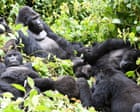
In an intricate tapestry of environmental and humanitarian challenges, the latest reports from across the globe offer a glimpse into both nature’s magnificence and its vulnerability to human activities and natural disasters. From the rich biodiversity of the Democratic Republic of the Congo to the bustling metropolis of Beijing and the resilient communities in Portugal and Mozambique, each region tells a story of survival, adaptation, and cooperation.
In a decision that has stirred global discourse, the Democratic Republic of the Congo (DRC) has embarked on a licensing round for 52 oil and gas blocks, opening more than half of the nation to fossil fuel exploration. This decision encompasses 124 million hectares, a substantial portion of which includes pristine forests and critical habitats for endangered species such as lowland gorillas and bonobos. These regions, identified by experts as the “world’s worst place to prospect for oil” due to their ecological importance and carbon-rich nature, highlight the delicate balance between economic growth and conservation efforts. Such developments could impact an estimated 39 million people and potentially undermine significant conservation initiatives.
Meanwhile, in Beijing, China, an unprecedented volume of rainfall has led to significant flooding, resulting in over 30 fatalities and the evacuation of tens of thousands of residents. Some districts recorded rainfall up to 543 mm, driving emergency responses from local authorities. The deluge affected the city’s peripheral districts more severely, far removed from the urban downtown, further challenging rescue and relocation efforts. Amid the disruption, community spirit and resilience were evident as evacuees and emergency responders collaborated to ensure safety and provide aid.
In Portugal, the region of Arouca has faced its own battle against the forces of nature with a large wildfire prompting efforts from more than 1,600 firefighting personnel. The fire, characterized by challenging terrain and multiple active fronts, also extended towards the neighboring area of Castelo de Paiva. This situation underscores the importance of coordinated firefighting efforts and emergency preparedness, with continuous engagement from the local community and authorities striving to mitigate the impacts on lives and properties.
Further south, in Mozambique’s Cabo Delgado, the humanitarian consequences of ongoing conflicts have displaced more than 26,000 individuals in just one week. The region has witnessed a tragic increase in violence attributed to extremist groups, leading to the displacement crisis and threatening regional security and livelihoods. As efforts to provide aid continue, this situation highlights the pressing need for peacebuilding initiatives and strategic partnerships to support affected communities and restore stability.
Each of these situations reflects the complex interplay between nature, communities, and governance. In the DRC, the call for sustainable development echoes in balancing ecological preservation with economic interests. In Beijing, the prompt response to natural calamities demonstrates both the challenges and achievements of managing urban resilience. In Portugal, the persistence and cooperation seen in combating wildfires emphasize the role of community and coordination, while in Mozambique, the plight of displaced populations calls for peace and humanitarian action.
As we reflect on these diverse yet interconnected narratives, they remind us of the shared responsibility in addressing environmental and humanitarian issues that transcend borders. The global community stands at a pivotal moment where collaboration and innovation are imperative in fostering a future where both natural ecosystems and human societies thrive harmoniously. Together, these stories offer not only a snapshot of current challenges but also an opportunity to engage in meaningful dialogue and action towards a more sustainable and compassionate world.
Source: {link}
